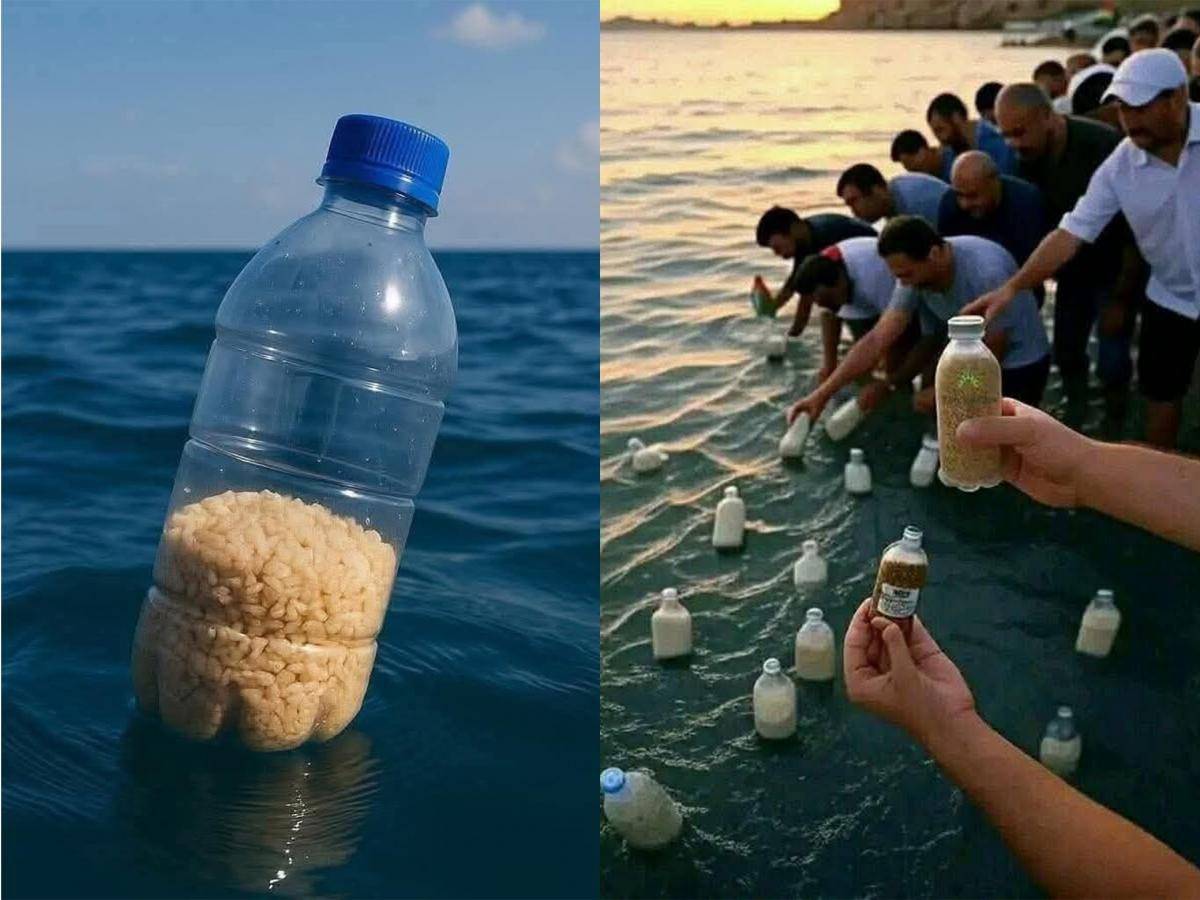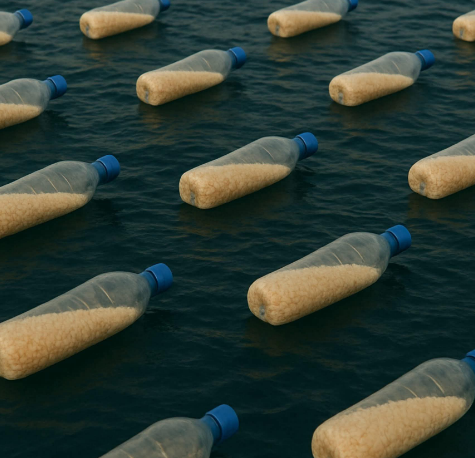Even the smallest gesture matters when governments fail and humanity falters.
– Mohammed Talha Siddi Bapa
In the shadow of Gaza’s suffering, where the air is thick with despair and the ground trembles under the weight of a merciless blockade, a quiet act of defiance ripples across the Mediterranean. From the shores of Egypt, Libya, Tunis, Morocco and beyond, common people – fishermen, teachers, mothers, and children – are filling-half plastic bottles with grains, lentils, and dates, sealing them with care, and casting them into the sea.
 These bottles, bobbing on the waves, carry not just food but a message: a desperate plea for humanity in the face of starvation, a symbolic stand against the suffocating siege imposed by Israel, and a call to awaken the conscience of a world that has turned its back.
These bottles, bobbing on the waves, carry not just food but a message: a desperate plea for humanity in the face of starvation, a symbolic stand against the suffocating siege imposed by Israel, and a call to awaken the conscience of a world that has turned its back.
The idea was born not in the halls of power but in the heart of an Egyptian engineer living in Japan, a man named Dr. Ahmed Yassin, who, far from his homeland, could not ignore the cries of Gaza’s hungry. Inspired by the ancient tradition of messages in bottles, he proposed a simple yet profound act: fill-half bottles with dry foods, release them into the Mediterranean’s currents, and pray they reach Gaza’s shores.
The science is uncertain – ocean currents may or may not carry these fragile vessels to their destination – but the sentiment is undeniable. It is a gesture of love, of solidarity, of resistance against a blockade that has choked Gaza, leaving over two million people on the brink of famine.
Picture the scene: on Egypt’s northern coast, near Damietta and Port Saeed, families gather at dusk. The sun bleeds orange into the sea as they kneel on the sand, filling one- and two-litre bottles with rice, lentils, and dried dates. A child scribbles a note – “You are not alone” – and tucks it inside. A fisherman, hands weathered by years at sea, seals a bottle and whispers a prayer before casting it into the waves. The bottles glint under the fading light, drifting eastward, carried by currents that may, against all odds, bring them to Gaza’s shores in 72 to 96 hours.
No one knows if they will arrive. No one knows if Israeli naval patrols will intercept them or if the bottles will simply vanish into the deep. But in this act, there is humility, a recognition that even the smallest gesture matters when governments fail and humanity falters.
Gaza starves. The United Nations has sounded the alarm, warning of mass starvation as over 950 aid trucks languish at the Egypt-Gaza border, blocked by Israel’s unrelenting siege. The World Food Programme reports that 96% of Gaza’s population faces acute food insecurity, with children’s bellies swollen from malnutrition and mothers unable to nurse their infants. Hospitals, already crippled by bombings, lack the supplies to treat the dying. This is not a natural disaster but a man-made catastrophe, a war crime enabled not only by Israel’s policies but by the complicity of world governments that supply arms, offer diplomatic cover, or simply look away.
The Bottle and the Date Palm: A Symbolic Act of Faith
This moment recalls a profound Quranic scene – when Maryam (A.S.), exhausted and alone after childbirth, was told by Allah to shake the trunk of a date palm. It was not her strength that brought down the dates, but her act of obedience and trust that preceded divine mercy. Today, the people on the shores of Egypt, Tunisia, Libya, and beyond are shaking their own symbolic trees. With no armies, no authority, and no guarantees, they cast bottles into the sea – fragile vessels filled with food, hope, and prayer. They do not know if the currents will carry them to Gaza, but they act anyway. Because when injustice reigns and governments fall silent, even a humble gesture becomes an act of resistance – and an invocation for divine intervention.
More Than Symbolism
The bottles are a response to this silence, a modern echo of the flotilla campaigns that have long challenged Israel’s naval blockade. Like the Mavi Marmara in 2010 or the ongoing efforts of the Hanzala, a ship sailing under the banner of MedLine, these bottles are a refusal to accept the status quo. They are not a solution – how could they be, when Gaza needs thousands of tons of aid? – but they are a symbol, a spark to ignite the conscience of nations.
From Morocco to Tunisia, Algeria to Libya, the call has spread: join us, send your bottles, let the sea carry our shared humanity to those who need it most.
Yet the tragedy lies in the necessity of such acts. Why must ordinary people, with no power but their hearts, resort to bottles when governments wield the authority to end this crisis? The siege of Gaza is not just Israel’s doing; it is sustained by the silence of those who claim to champion human rights. The United States, the European Union, and others who arm or shield Israel bear a moral stain. Their leaders attend summits, issue statements, and feign concern, while Gaza’s children die of hunger. The International Criminal Court has issued warrants for Israeli officials, including Prime Minister Benjamin Netanyahu, for war crimes, yet the blockade persists, and the world’s powerful do nothing.
The toll of this inhumanity is not just on Gaza. It erodes the souls of those who enforce it. Reports of Israeli Defence Forces soldiers struggling with mental health, some driven to suicide, reveal the cracks in a system built on oppression. Netanyahu, defiant and unyielding, may project strength, but the weight of these crimes cannot be ignored forever. The bottles, bobbing on the Mediterranean, are a mirror held up to his government and its enablers, reflecting a truth they cannot escape: you cannot starve a people into submission without losing your own humanity.
A Call to the World’s Conscience: Lift the Siege Now
This is a call to the world’s governments, to those who still claim to value justice and dignity: lift the siege of Gaza. Open the borders. Let aid flow. The bottles are a reminder that humanity persists, even in the darkest times, but they are not enough. Symbolic gestures cannot feed two million people. Only action – bold, principled, and immediate – can end this nightmare.
If you are human, if you believe in the sanctity of life, then act. Pressure Israel to end the blockade. Hold accountable those who enable this suffering. Let the bottles be a wake-up call, not a substitute for justice.
As the sun sets over the Mediterranean, the bottles drift on, fragile but resolute. They carry grains, lentils, dates – and something far greater: the hope that the world will finally listen.
Gaza cannot wait. Humanity cannot wait.




